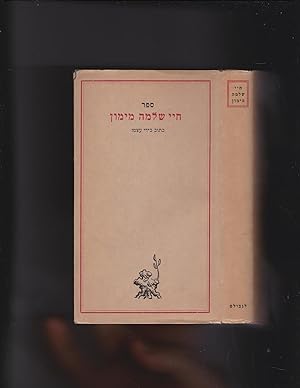Beschreibung
In Hebrew. Frontispiece, 338 pages. 183 x 111 mm. Salomon Maimon Born Shlomo ben Joshua (born 1753 in Zhukov Borok near Mir, Lithuania, Poland-Lithuania, present day Belarus. Died 22 Nov. 1800 Siegersdorf near Freystadt in Schlesien, Silesia, Habsburg Monarchy). His grandfather leased an estate from a Prince Karol Stanislaw "Panie Kochanku" Radziwill. Maimon was taught Torah and Talmud, first by his father, and later by instructors in Mir. He was recognized as a prodigy in Talmudic studies. His parents fell on hard times, and betrothed him to two separate girls in order to take advantage of their dowries, leading to a bitter rivalry. At the age of eleven he was married to one of the two prospects, a girl from Nesvizh. At the age 14 he was already a father and was making money by teaching Talmud. Later he learned some German from books and walked all the way to Slutsk, where he met a rabbi who had studied in Germany. He borrowed German books on physics, optics and medicine from him. After that he became determined to study further. Maimon describes how he took an interest in Kabbalah, and made a pilgrimage to the court of the Maggid of Mezritch around 1770. He ridiculed the Maggid's adherents for their enthusiasm, and charged the Maggid with manipulating his followers. He also wrote that the Maggid's ideas are "closer to correct ideas of religion and morals" than those he was taught in cheder. In his mid-twenties Maimon left his home area in the direction of the German-speaking lands. His first attempt to take up residence in Berlin in 1778 failed. He was expelled for possession of the Moreh Nebukhim of Maimonides. A later attempt to convert to Protestantism in Hamburg failed due to admitted lack of belief in Christian dogma. His second attempt to settle in Berlin in 1780 succeeded; he established a close connection with Moses Mendelssohn and entered the circles of the Haskalah (the Jewish Enlightenment movement) in Berlin. Mendelssohn introduced him to some wealthy Jews in Berlin, upon whom Maimon relied for patronage while he pursued his studies. He devoted himself to the study of philosophy along the lines of Leibniz, Wolff and Mendelssohn. In 1783, Mendelssohn asked Maimon to leave Berlin due to Maimon's open Spinozism. After a journey to Hamburg, Amsterdam and then back to Hamburg, he started attending the Gymnasium Christianeum in Altona. During his stay there he improved his knowledge of the natural sciences and his command of German. In 1785, Maimon left for Berlin (where he met Mendelssohn for the last time), then moved to Dessau, and then settled in Breslau, where he attempted to study medicine but eventually took up the position of a tutor. After many years of separation, Maimon's wife, Sarah, accompanied by their eldest son, David, managed to locate him in Breslau. She demanded that he either return to their home in Lithuania or give her a divorce. Maimon eventually agreed to the divorce. It was not until 1787 in Berlin that Maimon became acquainted with Kantian philosophy, and in 1790 he published the Essay on Transcendental Philosophy (Versuch über die Transcendentalphilosophie), in which he formulated his objections to Kant's system. Kant seems to have considered Maimon one of his most astute critics. Maimon published a commentary on the Moreh Nebuchim of Maimonides in 1791 (Gibeath Hamore, The Hill of the Guide). In 1792/3 he published his Autobiography (Lebensgeschichte). In 1795, Maimon found a peaceful residence in the house of a young Silesian nobleman, Count Heinrich Wilhelm Adolf Kalkreuth, and moved to the latter's estate in Siegersdorf near Freystadt in Schlesien. Maimon died there at the age of 48 from apparent alcoholism. Bestandsnummer des Verkäufers 013403
Verkäufer kontaktieren
Diesen Artikel melden
![]()




